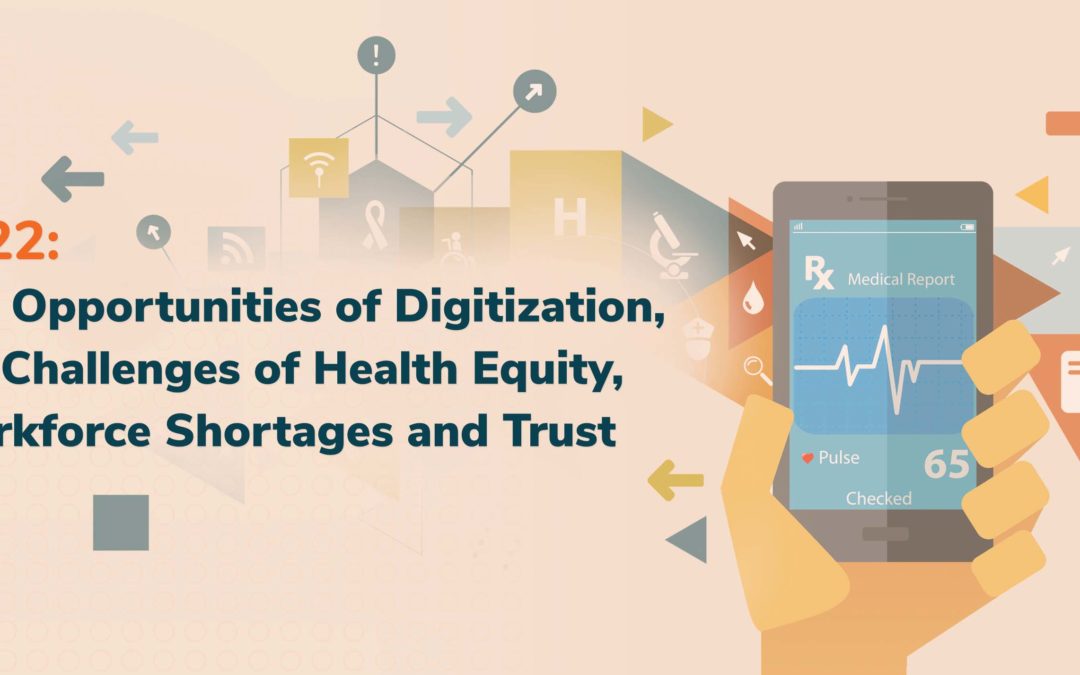Our next webinar features a conversation with Natalie Schibell, senior analyst at Forrester.
Natalie has 15 years of experience driving functional strategy, organizational learning, and business process transformation. Prior to her role at Forrester, she served as a public health analyst at the CDC’s National Center for Emerging and Zoonotic Infectious Diseases, and she was a member of the US Navy’s Medical Service Corps for 10 years.
She will share key findings from her recent report, Predictions 2022: Healthcare. Here’s a preview.
The Challenges Ahead
Natalie will focus on three key challenges on the horizon for the healthcare industry based on research conducted for the report. We’ll discuss how healthcare organizations can address these issues while continuing to deliver high-quality, patient-centered care.
1. Health Equity
According to a blog post summarizing the report, Forrester predicts that health disparities will harm rural Americans at twice the rate of urban Americans in 2022, despite the federal push to bridge gaps in access to care services. During the webinar, we’ll dive deeper into the reasons for this inequity and the health consequences for entire populations — if the healthcare industry does not prioritize overcoming it.
2. Workforce Shortages
As the COVID-19 pandemic wanes and more variants emerge, healthcare workers face extreme pressure and stress. As a result, large numbers are leaving their positions. An October 2021 data brief from the American Hospital Association found that hospital employment had decreased by 94,000 since February 2020, including a decrease of over 8,000 between August and September 2021.
Forrester predicts that workforce shortages will persist in 2022, given ongoing economic uncertainty, clinician burnout, and hospital closures. Navigating the shortages while delivering high-quality care and maintaining operational efficiency will be a focus of our conversation with Natalie.
3. Mistrust
The Forrester blog post also states that over the next three months, misinformation and anti-vaccine activism will intensify, resulting in widespread vaccine resistance. Ultimately, the firm predicts healthcare will exit the “trusted” category in 2022. Natalie will provide key insights into this transition and discuss how public health, public policy, and cybersecurity can work together to combat mistrust.
The Digital Opportunities
The healthcare industry has seen an explosion of digital solutions since the beginning of the pandemic, and they will only grow in relevance in 2022. Bringing healthcare to patients rather than requiring them to visit a specific location can positively impact health equity, care delivery amid labor shortages, and trust in the healthcare system.
According to Forrester, hospital-at-home services gained the greatest momentum in 2021 and will continue to grow in 2022 due to the Home Health Prospective Payment System proposed rule, which accelerates the shift from volume-based Medicare payments for home health services to value-based payments.
By promoting telehealth options for all patients, health systems can help reduce inequity between urban and rural populations, making location much less relevant for access to care. Additionally, these solutions can streamline and expedite care delivery, which reduces the burden on an increasingly smaller staff. Patients have repeatedly shown they want the convenience of digital care; making telehealth widely available and accessible could be a key step in winning back trust across the industry.
“Throughout our research we learned that consumers don’t want to wait in line or visit a doctor in person if they don’t need to,” said Natalie in a recent FierceHealthcare story detailing the closure of 900 CVS Health stores. “They’ve been trained by Netflix, Doordash, grocery delivery, Uber, and Amazon, etc., for instant everything.”
Register for the Webinar
Lirio supports healthcare organizations’ initiatives to address challenges around health equity, workforce shortages, and mistrust. Our behavior change AI platform deploys hyper-personalized communications that move patients toward the right actions on their unique health journeys – including getting vaccinated, scheduling a telehealth appointment, attending a cancer screening, and more.
We’ll share more about how this works during our conversation with Natalie on Thursday, December 16 at 1:00 p.m. ET. Register today to save your spot for “2022: The Opportunities of Digitization, the Challenges of Health Equity, Workforce Shortages and Trust.”
Follow Lirio on Facebook: Facebook.com/lirio.llc, LinkedIn: LinkedIn.com/company/lirio, and Twitter: @Lirio_LLC.
Other readers viewed:
Lirio Launches Lirio Precision Nudging™ Solution for Well Visit Adherence
How to Make Patient-Centered Care Sustainable
How Behavior Change AI Addresses SDOH
Use Lirio Precision Nudging™™ to Understand and Overcome Barriers to Women’s Healthcare
Reach Out
Want to learn more about how Lirio’s behavioral engagement solution utilizes behavioral science and machine learning to help organizations motivate the people they serve to achieve better outcomes?
